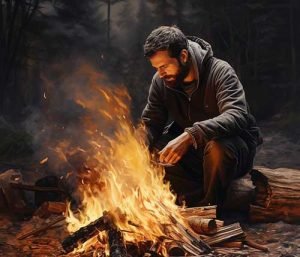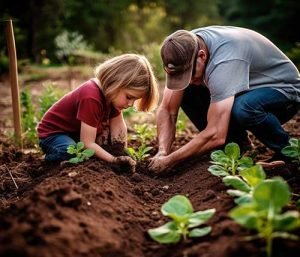Here are 8 tips for learning survival skills that will serve you well because when it comes to survival prepping, everyone focuses on what they need to stock up on such as food, water, and other gear but often they often don’t know how to use the products they bought or even be strategic about their situation.
Survival skills are handy in everyday situations, but they ultimately bring you peace of mind. Whenever a disaster strikes, whether by nature or mankind, you want to have a feeling of calm come over you, knowing you can handle it.
If you own gadgets for starting a fire, but you’ve never practiced it before, you might get frustrated trying to build one to cook food or stay warm. Knowing you have a machete on hand to build a shelter might make you feel a little safe, but knowing all of the skills involved in putting together a sturdy one is very different.
Below, you’ll find some tips that you can use to build your survival skills, and these are things you need to get your loved ones involved in as well. It’s never a good idea for just one person in a group to have all of the skills necessary to support an entire family.
8 Tips For Learning Survival Skills
#1 – Practice Cooking without Electricity
Having survival food stocked up is a wonderful accomplishment. Whether you’ve saved lots of canned goods and nonperishables, or invested in specific shelf-stable survival means that will last you 10-30 years, it’s a smart start.
But it’s not enough. Most people are used to looking up recipes on the fly, cooking in the oven or on the stove, or simply sticking something in the microwave to cook it quickly. If you asked most people to cook without these conveniences, they’d be lost.
You need to learn and practice skills like starting a fire and cooking over one. You also might get a solar cooker and practice cooking in one of those. You may not have a meat thermometer, so you need to teach your loved ones how to tell if something is safe to eat.
You might want to learn other skills like dehydrating meats into jerky or canning the fruits and vegetables that you grow without a stove and pressure cooker. You also want to practice cooking in different weather elements – both extreme heat and cold.
You might want to try creating your own electricity!
#2 – Test Your Fire-Starting Abilities
 Most people think it’s easy to start a fire. You get some wood, put some kindling under it and light a match. But it’s not that simple, really. And if you don’t have the perfect wood pieces and kindling or matches, it becomes more difficult.
Most people think it’s easy to start a fire. You get some wood, put some kindling under it and light a match. But it’s not that simple, really. And if you don’t have the perfect wood pieces and kindling or matches, it becomes more difficult.
You want to learn how to start a fire when it’s snowing, how to start a fire when your gear is wet, and how to start a fire with things like flint and steel instead of matches or a lighter.
Safety is also a concern. You want your kids and spouse to know how to safely start and extinguish a fire. The last thing you want to have happen is to start a wildfire in a bug out situation, where you put yourself at more risk.
#3 – Build a Shelter with and Without Gear
While some people know how to put a tent up, others struggle. This can be a problem when you are in a desperate situation. But most people, given enough time, can eventually figure it out.
The problem arises when you don’t have a shelter handy at all. You may eventually end up in a situation where you have to fashion together a shelter from whatever is around you.
You will need to know how to find the best place to build one – an area that’s going to stay dry and helps you stay camouflaged from others. You have to choose the kind of shelter you’re going to build, like a shelter made of snow, one made from tree limbs, or one fashioned from nearby brush.
#4 – Learn and Practice First Aid Skills
Taking a first aid kit and practicing how to use the products included in it is a good idea. Although you can’t actually go through the motions of causing an injury so that you can administer first aid, you can still learn.
Take each item from the kit and look up how it should be used. Even if there’s not a gadget for it, you can look up common problems that can occur and learn how to handle them.
This might be something like learning how to perform CPR or the Heimlich maneuver. Knowing how to assess someone’s injuries and treat it properly is just as important (if not more) than the products in your first aid kit.
#5 – Get Your Family Used to Rotating Supplies
Rotating supplies is a great way to learn how to use many of your products. But make sure that when you use them, you replace them. Learning how to keep track of the quantity and expiration dates of items is an important part of staying safe.
Whenever someone uses any of the items, have them cook the food or use it the way they would in a survival situation when the grid is down. For example, if they want to use a can of green beans, make them practice using it over a sterno can stove (at least once so that they familiarize themselves with it).
#6 – Find Out Your Growing Zone and Learn How to Garden
 If the food supply chain suddenly grinds to a halt, grocery stores will have bare shelves very quickly. Whatever you have on hand better be enough to keep you fed for a long time.
If the food supply chain suddenly grinds to a halt, grocery stores will have bare shelves very quickly. Whatever you have on hand better be enough to keep you fed for a long time.
You can’t expect to suddenly grow a garden in a week or even a few weeks and feed your family. It takes awhile to not only plant seeds and grow them to harvest, but to learn the process and not encounter trouble along the way.
Many beginner gardeners struggle to grow a garden because their soil isn’t right, they don’t know how to keep pests away, and they mess up with things like making sure the plants have the right amount of water and sunlight, so learning and practicing this now is imperative to your peace of mind. Find out your growing zone to make things easier.
#7 – Study Multiple Uses for the Same Products
There are many products in your survival gear that have multiple uses. Spend some time learning about this now. For example, duct tape can be used to repair a tarp, sleep bag or bug out bag.
It can be used as a belt or to build a shelter. You can even use it in some instances for first aid, such as suturing a wound. If you run out of gauze and bandages, using duct tape might be a great alternative.
Paracord is another item that has many uses. From helping you fish and hunt to giving you what you need to help start a fire or build a shelter, these bracelets are wonderful in a survival situation – but only if you’re knowledgeable about it.
#8 – Sign Up for Classes That Can Help You
 Another way to learn and improve your survival skills is to take classes that can help you. Of course, there are actual survival schools that train you in a variety of things. But there are also specific classes you can take for individual skills.
Another way to learn and improve your survival skills is to take classes that can help you. Of course, there are actual survival schools that train you in a variety of things. But there are also specific classes you can take for individual skills.
You can take classes on camping and wilderness medicine or simple first aid classes. You can hire a guide to go along with you in your geographic location and teach you how to begin foraging for food such as edible plants, nuts, seeds and berries in nature.
You can also sign up for security and self defense classes. Some of the learning you can do will be online, via video or eBooks. But there are also many in-person classes you can find locally to attend and increase your knowledge even more.
Survival skills are important for everyone to know, even if you’re not a survivalist. They can be useful in everyday situations, like cooking without power or starting a fire. And in the event of a disaster, survival skills can be life-saving.
Even if you’re not planning on surviving a zombie apocalypse, knowing a few basic survival skills is always a good idea. It could save your life or the life of someone you love.
